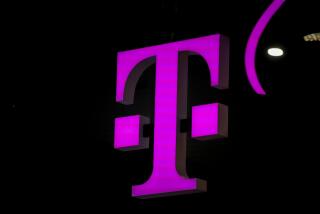SBC, BellSouth to Link Wireless Operations
- Share via
SBC Communications Inc. and BellSouth Corp. today are expected to announce the combination of their U.S. wireless operations, creating the nation’s second-largest mobile phone-service provider.
The deal could prove to be good news for customers of both companies, because the new venture would likely produce new rate plans that eliminate or sharply reduce fees for “roaming,” the pricey per-minute fees that carriers charge when customers use their mobile phones outside their home markets.
In California, for example, SBC-owned Pacific Bell Wireless has been unable to offer the kinds of “no-roaming” rate plans that have become popular with the most lucrative kinds of customers--heavy users who travel frequently.
While Nextel Communications was the first U.S. provider to jettison roaming fees, AT&T; Wireless upped the ante by introducing high-end rate plans that eliminated both roaming charges and long-distance fees. Other carriers, including Sprint PCS and Vodafone AirTouch, followed with similar offerings.
“Those plans seem to be attracting a lot of customers, and to the extent that SBC and BellSouth could offer plans with no roaming charges, that would be exciting for consumers,” said Charles Mahla, a senior economist who studies wireless pricing for Los Angeles-based Econ One Research Inc.
San Antonio-based SBC has 11.2 million mobile phone subscribers in California and 22 other states under six different brands. BellSouth, based in Atlanta, has 5.3 million wireless customers, mostly in the Southeast.
Analysts have said they do not expect BellSouth Wireless Data--a separate BellSouth business--to be included in the deal with SBC. Analysts expect the combined SBC/BellSouth to eventually go public.
A combination of the two wireless units would have more than $8 billion in annual revenue and 16.5 million mobile customers nationwide. It would rank second in size to Verizon Wireless, created this week by Vodafone AirTouch and Bell Atlantic, which will have more than 24 million wireless customers once Bell Atlantic completes its merger with GTE Corp.
AT&T; Wireless, which has long held the position as the nation’s largest carrier, would drop to third, with more than 12 million customers.
AT&T; is gearing up to sell stock in its wireless unit in what is expected to be the nation’s largest initial public offering--raising up to $13 billion.
Aware of Wall Street’s appetite for anything wireless, other companies are following suit. BellSouth has said it will issue a “tracking stock” for its Latin American wireless business, and Bell Atlantic and Vodafone AirTouch will do the same with its new Verizon venture. In 1998, Sprint Corp. created a tracking stock for its Sprint PCS unit.
The investor enthusiasm stems from the high-octane growth in wireless in the U.S., and especially overseas. About 87 million wireless phones are in use in the U.S today, and the number is expected to double within five years, according to the Boston-based Yankee Group.
The teaming of BellSouth and SBC has seemed inevitable for the last year, as large U.S. regional carriers began linking networks to create scale and cut marketing and operating costs.
“When the dust settles, we’ll have fewer, larger players that offer a wide range of services,” said Jeff Kagan, a telecommunications analyst based near Atlanta. “It’s no longer going to be a hodgepodge of regional companies.”
More to Read
Inside the business of entertainment
The Wide Shot brings you news, analysis and insights on everything from streaming wars to production — and what it all means for the future.
You may occasionally receive promotional content from the Los Angeles Times.










